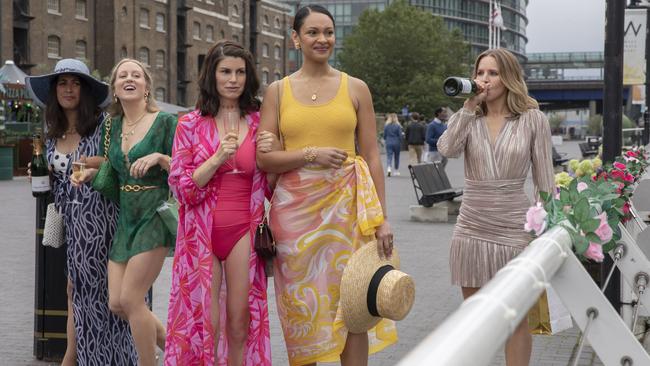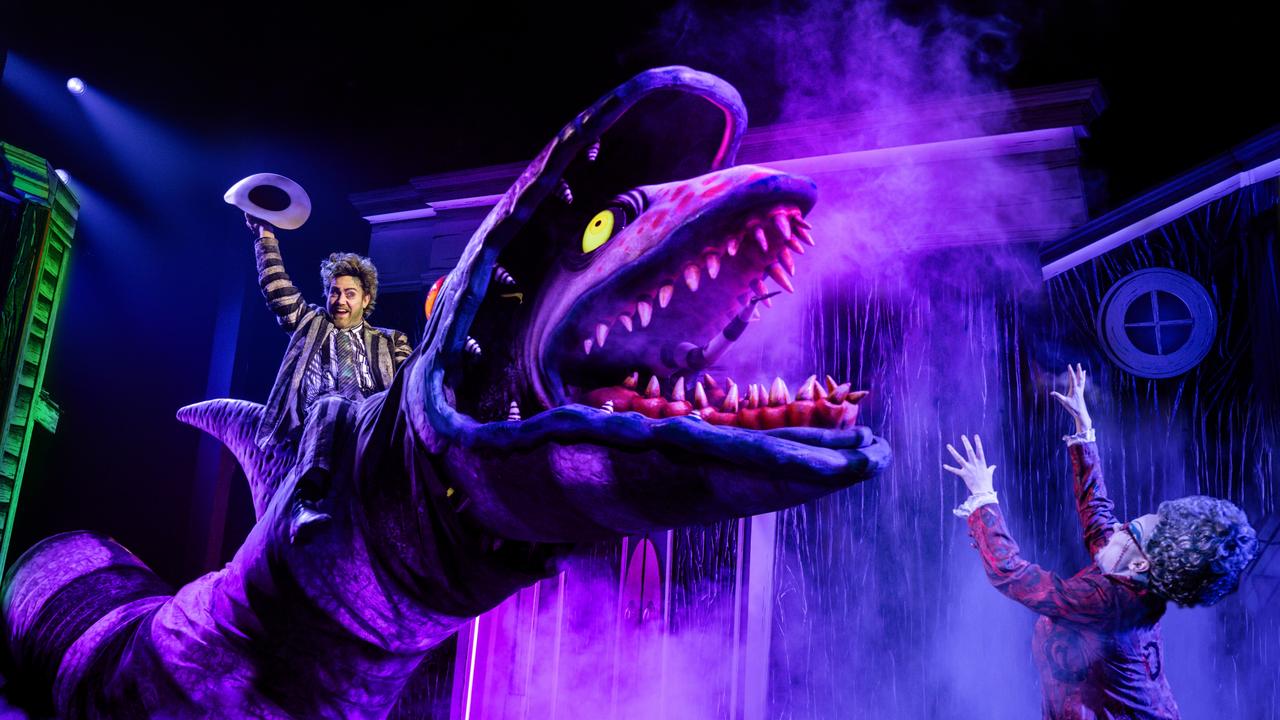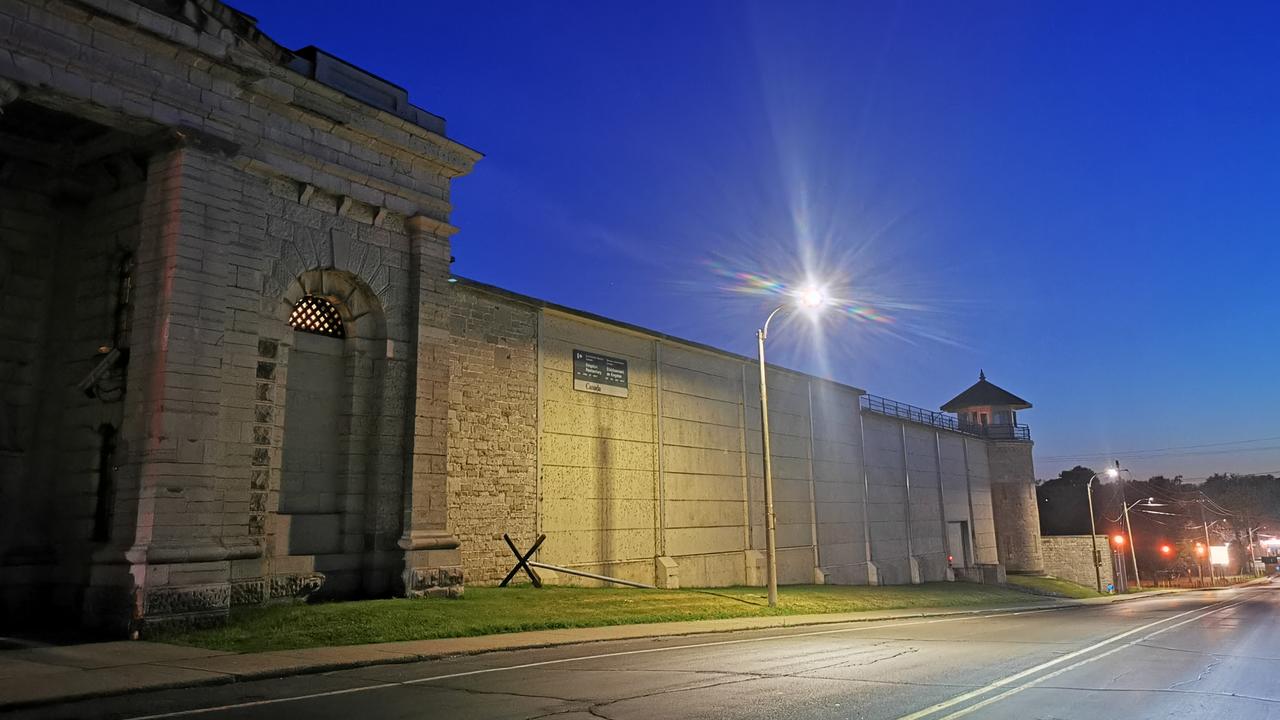The People We Hate at the Wedding, guests you’d rather not entertain
The People We Hate at the Wedding ticks all the required boxes for a movie about nuptials: the bachelorette party, the rehearsal dinner, the drinking, the vomiting.

The People We Hate at the Wedding (MA15+)
Amazon Prime
★★★
What are the best and worst on-screen weddings? There are a lifetime of them to choose from and everyone will have their own favourite. I suspect The Godfather and The Graduate will be up there.
My top-of-the head worst and best, for the characters, are the Red Wedding in Game of Thrones and the sumptuous Russian wedding that opens Michael Cimino’s 1978 masterpiece The Deer Hunter.
The latter is glorious to watch and, in that moment, life affirming for the characters. As the film moves on, they head more in the Game of Thrones until-lots-of-deaths-do-we-part direction.
The nuptials at the centre of the American comedy The People We Hate at the Wedding do not have as high a body count, although some of the guests may wish it were so.
It’s Donna (Allison Janney), the mother of the bride Eloise (Cynthia Addai-Robinson), who sums up the title of this 100-minute movie.
Reminiscing with her two other children, Alice (Kristen Bell) and Paul (Ben Platt), she recalls the must-avoid people at bad weddings such as “the cousin on the dance floor humping everything in sight’’.
This time, she tells them, “We’re those people”.
She’s not wrong about that. This movie, directed by Claire Scanlon and written by the Molyneux sisters of Bob’s Burgers fame, is about a group of messed up – aka ordinary – people. It is based on the 2016 novel by Grant Ginder.
London-domiciled Eloise is the daughter of Donna and her first husband, the rich, handsome Frenchman Henrique (Isaach de Bankole). She is beautiful and well-off.
Alice is an architect but works as a personal assistant to a “Mark Zuckerberg lite”, as someone puts it. He is married and she’s sleeping with him.
Paul, gay and in a relationship, is a counsellor in a tough-love therapy firm where people pay thousands of dollars to overcome their phobias.
The scenes of him at his do-not-soothe workplace are funny and probably true. At one point his boss dresses him down. “Would you pick up a baby every time it cries?’’
Alice and Paul are the children from Donna’s second marriage. Their father is dead. Donna, Alice and Paul are bundles of various anxieties, all of which are in the carry-on baggage as they cross the Atlantic for Eloise’s wedding.
It’s an ensemble cast but Bell is the star. She is perhaps best known for the sitcom The Good Place, and this movie shares the vibe of that show.
Eloise is the golden child, like Tahani in The Good Place. Alice is the underachiever who drinks too much and speaks without thinking: “I am five minutes away from homiciding someone.”
This is an entertaining light comedy that ticks the required boxes for a wedding movie: the bachelorette party, the rehearsal dinner, the drinking, the vomiting (“My god, you kids still barf a lot,’’ Donna observes).
Yet it has a serious side.
Both Alice and Eloise have secrets they have not shared. And when Donna, still half in love with Henrique, confronts him and “apologises” for their time together, it’s a reminder of why Janney has an Oscar (for I, Tonya, opposite Margot Robbie).
It’s a little speech full of truths. It’s about how casually we can let go of the rare things that truly matter, and how foolish it is when we do so.
-
All Quiet on the Western Front (MA15+)
Netflix
★★★★
The two best war novels I have read are by soldiers, one Australian, one German, who waded through the mud and blood of World War I and lived to write about it: The Middle Parts of Fortune by Frederic Manning, and All Quiet on the Western Front by Erich Maria Remarque.
No film has been made of Manning’s 1929 novel, which was blurbed by Ernest Hemingway. A 1930 Hollywood film of Remarque’s 1928 novel, directed by Lewis Milestone, won Oscars for best picture and best director.
Now, more than a century after the war that was supposed to end all wars, we have a German adaptation of All Quiet on the Western Front and it is a spectacular film.
It presents, in breathtaking fashion, the human face of war, in all its horror, banality and, above all, relentless waste.
And that human face is not old enough to vote. The central character, Paul Baumer (newcomer Felix Kammerer) is 17 when he, and many of his classmates, are cajoled into enlisting.
“The Kaiser needs soldiers not children,” they are told.
Yet, as Kurt Vonnegut put it in the alternative title to his own war novel, Slaughterhouse-5, it is The Children’s Crusade.
It is 1917, their destination is the Western Front and their enemy is the French. They sing silly ditties as they march off on the road to war.
That singing does not last long. “This isn’t how I imagined it,’’ says the bespectacled Ludwig Behm (Adrian Grunewald) as they bale the slop out of the trenches.
This 143-minute movie is seen from Paul’s perspective, as is the novel. It is in German with English subtitles.
The director and co-writer, Edward Berger, was born in 1970. In one interview, he said Germany’s role in the two world wars “is in my DNA” and it was time to tell that story, one of “shame, guilt, horror, responsibility”, from a German perspective.
He added that he started making the film before Russia invaded Ukraine. When the invasion did happen “it felt resonant of how it was 100 years ago”.
As an aside, the director’s best-known English language work is the outstanding 2018 mini-series Patrick Melrose, based on the novels by English writer Edward St Aubyn, and starring Benedict Cumberbatch and Hugo Weaving.
The titular quiet in Remarque’s novel comes at the end and it involves Paul. Berger, however, fills the film with visceral, unspoken, nods to the word throughout the film.
When Paul receives his uniform he, being a polite young man, returns it because it has someone else’s name tag on it. An official cuts off the name tag, drops it to the floor, where it lands quietly among others, and hands back the uniform.
That same uniform, before it becomes Paul’s but after it was Heinrich Gerber’s, is quietly washed clean of blood, along with countless others, in a warehouse-sized laundry and then repaired, its bullet and/or bayonet holes sewn up, by women working a battery of sewing machines.
When there is a lull in the fighting, the living soldiers must take the dog tags from the dead. Later, officials at desks go through the dog tags and quietly record each man’s date of birth and date of death.
The battle scenes, spectacularly shot by English cinematographer James Friend, who worked with the director on Patrick Melrose, juxtapose the emerging industrialisation and timeless intimacy of war.
When French tanks roll over the German trenches and French troops follow with flamethrowers, it is hard to watch this casual crushing and burning of young human life.
Yet so is the scene where Paul stabs a French soldier and then lies beside him in a crater, feeling terrible, as he breathes his final blood-specked breaths.
As a slightly older soldier, an illiterate cobbler named Stanislaus Katczinsky (a superb Albrecht Schuch), who befriends the educated Paul, tells him, “I am a pair of boots with a rifle”. As in the novel, Kat is a deeply moving character.
Away from the battlefields, the German leadership, headed by Matthias Erzbergher (Daniel Bruhl), tries to negotiate an armistice with the French, who know they have the upper hand.
Here the director, who knows what Remarque could not in 1928, perhaps overplays the idea that the next war is already on the drawing board. He makes some other changes to the novel, some minor, some less so, but none of them diminishes the raw power of this film.
In another aside, it was another Australian soldier who fought in WWI, Arthur Wheen, who in 1929 translated Remarque’s Im Westen Nichts Neues (Nothing New in the West), and came up with its now-famous English title.
At the 1930 Oscars, their third instalment, All Quiet on the Western Front became the first film based on a novel to win best picture. Now Berger’s movie, filmed in the language the novel was written, is Germany’s nomination for best foreign film at the 2023 Oscars.




To join the conversation, please log in. Don't have an account? Register
Join the conversation, you are commenting as Logout